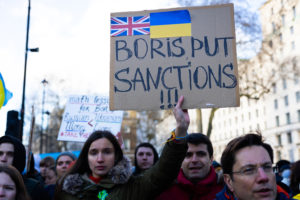“We cannot just witness these atrocities and do nothing.” It’s a statement that resonates, the kind of thing you’d expect to hear from those we empower to keep the peace: Nato, the UN, our leaders. But this solemn vow to do something came not from a government official nor a global peace organisation, but from the International Cat Federation, which last week announced that cats bred or owned by Russians would be barred from competition henceforth. It was a decision that made headlines around the world. Some criticised it; some heartily approved. But everyone who engaged with that story had one thing in common: they clicked.
After all, what else were they going to do?
The conflict in Eastern Europe has thrown the inherent tensions of digital culture into sharp relief. If the war itself is unfolding too slowly, a public hungry for content will get their fix in other ways, filling the void with viral videos and Ukrainian flag emojis, finger-wagging everyone else for being insufficiently engaged, or sombre, or whatever. We may not be on the ground in Ukraine, but we’re on the front lines of the accessory culture war, fighting our common enemy with the only weapon we’ve got: cancellation.
Russian films have been barred from festivals in Glasgow and Toronto, while Hollywood films from Disney, Sony, and Warner Bros are skipping their Russian release. London’s Royal Opera House has cancelled the Bolshoi Ballet. Russian athletes (and in some cases, those from neighbouring country and ally Belarus) have been suspended from competition by FIFA, the International Skating Union, and the Paralympics. In Milan, a course on Dostoevsky — which perhaps didn’t mention the fact that he spent multiple years in exile for defying the Russian state — was cancelled (albeit reinstated after backlash).
And then there’s the vodka, that famous export now the subject of performative destruction. In American liquor stores and supermarkets, Russian vodka has been removed from displays; in a viral Twitter post, a bartender at a ski resort in Vermont poured a bottle of Stoli down the drain.
Even as reasonable voices beg the general public to maintain a sense of perspective — and as countless articles seek to remind us, “the war is not about you” — the impulse is nevertheless easy to understand. No longer is politics a topic thought to be best avoided in public; these days, your good standing in polite society (not to mention the continued operation of your business) requires your vocal participation in the cause du jour. One is reminded of that moment in mid-2020 when every corporation suddenly felt compelled to announce its support of Black Lives Matter in the most strident possible terms. Neutrality was complicity; silence was violence. Somewhere along the way, we decided that we need to know who our neighbours vote for. We need to know if the local hardware store supports the LGBT community. We need to know Doritos’ deep thoughts about racism and police brutality. We need, we insist, to know how the International Cat Federation feels about Vladimir Putin.
Because in spite of everything, we remain convinced that this is, somehow, all about us: our sense that we are owed complete political solidarity by the brands we consume, our histrionic sense of betrayal when we don’t get it. The ski resort bartender pouring his Stoli down the drain would probably like to think of himself as a resistance hero; really, he’s more akin to the angry Republicans who set their Nikes on fire when the company hired Colin Kaepernick as a spokesman.
Now, as in 2020, people generally mean well — even if what they’re doing ranges from empty gestures to gross absurdities. As those in charge strategise support for Ukraine and sanctions against Russia in the hopes of achieving submission through economic starvation, culture warriors hope that barring Russian athletes and artists from the global stage is an effective secondary strategy. One such argument in The Atlantic suggested that depriving ordinary Russian citizens of the pleasures of seeing their country compete in the Olympics or enjoying the latest MCU blockbuster might provoke them to turn on their leaders — not to mention how much it’ll piss Putin off. (“The decisions to strip him both of his titles as honorary president and ambassador of the International Judo Federation and of his honorary black belt in tae kwon do are particularly personal blows”.)
That’s the optimistic take, of course; the cynical one is to note how very, very reminiscent this argument is of that moment when Left-wing commentators thought they were really sticking it to Donald Trump by making fun of the size of his hands and referring to him as “Drumpf”. You know, right before he was elected the President of the United States.
And even if the symbolic resistance of cultural boycotts is an important piece of the puzzle, then those measures still need to make sense — and here one must note, setting aside the questionable impact of one man in Vermont trashing one bottle of spirits that was already bought and paid for, that Stoli vodka is not actually produced in Russia. The Stoli company is Latvian and owned by the Luxembourg-based SPI beverage group.
This absurdity reveals the dark side of the current fever: adopting a hostile stance toward anything that sounds Russian is undergirded by a potent mix of ignorance and misdirected aggression that ought not to be indulged. It’s the sort of blunt impulse that led to the harassment of blameless, turban-wearing American Sikhs in the wake of 9/11, a spasm of bigotry against anything that seemed Muslim which we now look back at with shame and chagrin. Even as much remains uncertain, we know that this with-us-or-against-us line of thinking rarely leads anywhere good.
Well-intended or not, imposing guilt by association on ordinary Russians — the classical musicians, the cat owners, the athletes — in the hopes of inspiring mass resistance against Putin is absurd. Demanding that Russian expats denounce their homeland contains ugly shades of McCarthyism (not to mention that speaking out may put their families at risk). And in the case of Russians now trapped in their country, it’s not just morally questionable but unlikely to be effective, given the country’s merciless crackdown on dissenters against the war. It’s easy for westerners to forget that our willingness to protest our government goes hand in hand with the guaranteed freedom to do so; if speaking up came at serious personal risk, many of us would choose to keep quiet (and keep our skulls intact).
It’s also a betrayal of an important tradition, one in which art, sport, and culture are supposed to sustain our sense of shared humanity in times of tragedy, including war. There’s a reason why the famous Christmas ceasefire during World War I was marked by football matches and music — or why, when the Cold War between the then-USSR and the US finally ended, it was thanks in part to the effects of cultural exchange and engagement between the two nations. Of the many videos to emerge from Ukraine in the past week, some of the more hopeful ones show Russian prisoners being offered bread, tea, and a chance to call their parents.
Yes, these isolated feel-good stories pale in comparison to the wide-ranging and countless horrors of war, but the sentiment they contain is anything but cheap: embedded in each of these moments is a broader perspective, the understanding that we all still have to share a planet when the fighting is done. To isolate, alienate, and demonise those on the other side may satisfy one’s sense of purpose in the moment, but it also creates rifts with our neighbours that are not easily fixed.
Meanwhile, Americans of all people should understand that the citizens of a country cannot be expected to shoulder the guilt of their president’s misdeeds. The character of an entire people is not defined by the worst whims of its most authoritarian lunatic. But here, too, our perspective is skewed: we are too used to being able to criticise, insult and openly rail against our political leaders. We are too used to the meaningless performative bluster of American politics. We are, in short, so used to culture wars that we’ve forgotten that real wars have different stakes and are not won by rhetoric — and that if the US decided to truly involve itself in this conflict, a victory would not be measured by how much we managed to hurt Putin’s feelings.
In the meantime, punishing a bunch of figure skaters, cats, filmmakers, and the corpse of Fyodor Dostoevsky for Vladimir Putin’s warmongering is the emptiest of endeavours, like painting half your face blue and booing your favourite football team’s rivals from the safety of your living room. But nobody will emerge at the end of this conflict to hand out awards for team spirit; nobody will congratulate you for all the vodka you didn’t drink. Nobody will ask you, “What did you do during the war?”, when the war had nothing to do with you. And when someone says, “We cannot just witness these atrocities and do nothing”, the truth is: yes, you can. Better a witness than a self-involved keyboard warrior. Better to watch than turn away.
Disclaimer
Some of the posts we share are controversial and we do not necessarily agree with them in the whole extend. Sometimes we agree with the content or part of it but we do not agree with the narration or language. Nevertheless we find them somehow interesting, valuable and/or informative or we share them, because we strongly believe in freedom of speech, free press and journalism. We strongly encourage you to have a critical approach to all the content, do your own research and analysis to build your own opinion.
We would be glad to have your feedback.
Source: UnHerd Read the original article here: https://unherd.com




